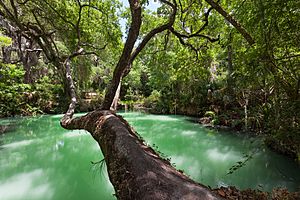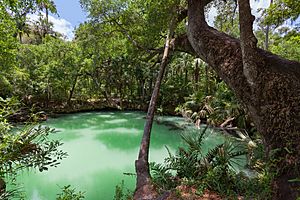Green Springs Park facts for kids
Quick facts for kids Green Springs Park |
|
|---|---|

Green Springs viewed from the west bank looking toward the east
|
|
| Lua error in Module:Location_map at line 420: attempt to index field 'wikibase' (a nil value). | |
| Location | Enterprise, Volusia County, Florida |
| Area | 36 acres (15 ha; 0.056 sq mi) |
| Created | September 27, 2008 |
| Operated by | Volusia County Parks, Recreation and Culture Division |
| Open | Sunrise to sunset |
Green Springs Park is a cool public park in Enterprise, Florida. It's famous for its unique green-colored sulfur spring! Long ago, it was a health resort, and it's also an important place for finding old artifacts. After many years of planning, the park finally opened in September 2008.
Contents
About Green Springs Park
Green Springs Park is found near the north shore of Lake Monroe. It's about 2.5 miles (4.0 km) east of Interstate 4 in Enterprise, Florida. The spring sends fresh water into Lake Monroe. This water comes from the Florida aquifer, which is a huge underground water source.
The spring's pool is about 70 feet (21 m) wide and 76 feet (23 m) deep. The water's color changes throughout the year. It can be green in spring, turquoise in summer, green again in fall, and jade in winter.
Nature and Trails at the Park
The park is mostly a hardwood hammock. This means it has lots of trees like Live oak, Magnolia, Cedar, and Pine. You might even spot some rare plants here, like the Green-fly orchid.
There's a 12-foot-wide (3.7 m) paved path for walking or biking. Many smaller dirt paths also wind through the park. Green Springs Park is also a starting point for two bike trails: the East Central Regional Rail trail and the Spring-to-Spring trail.
Ancient History of the Park
Green Springs Park is a very important place for history and archaeology. Long ago, there was a huge shell midden near the spring. A midden is like an ancient trash pile made of shells, left by early people. Most of this shell mound was used up before 1885 for things like building roads.
The small parts that are left still hold amazing clues. Scientists have found old tools, pieces of pottery, and even remains of humans and animals. These finds help us learn about the people who lived here thousands of years ago.
History of Green Springs
Early Uses of the Spring
Green Springs was a very important spot for Native American tribes. Groups like the Mayaca and the Seminole visited the spring often. They believed the sulfur water had special healing powers.
In 1841, a man named Cornelius Taylor was one of the first settlers in the area. He built a hotel on a large shell mound near where the spring flows into Lake Monroe. Taylor told people his hotel was a health spa. He claimed the spring's water could help people feel better.
Later, by 1883, the spring was owned by Frederic DeBary. He was a rich wine importer from New York. Guests from his fancy home, DeBary Hall, would come to the spring for fun and relaxation.
Saving Green Springs Park
For many years, people worked hard to make Green Springs a public park. In 1984, there was a plan to build a large apartment complex on the land. But local residents really wanted to save the spring. They asked the Volusia County Council to stop the plan.
The Council agreed and decided to try and buy the land instead. They wanted to turn it into a place for ecotourism. This means a place where people can enjoy nature and learn about the environment.
It took a long time, but plans were made to create a simple park. It would have natural paths and basic parking. Finally, after almost 24 years of planning and hard work, Green Springs Park was ready.
Before the park opened, many volunteers helped clean up the area. They removed plants that didn't belong and could harm the native plants. The park officially opened on September 27, 2008. It cost almost $1 million to buy the land and make it ready for everyone to enjoy.


